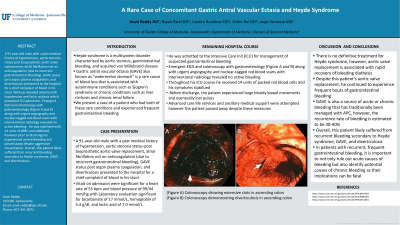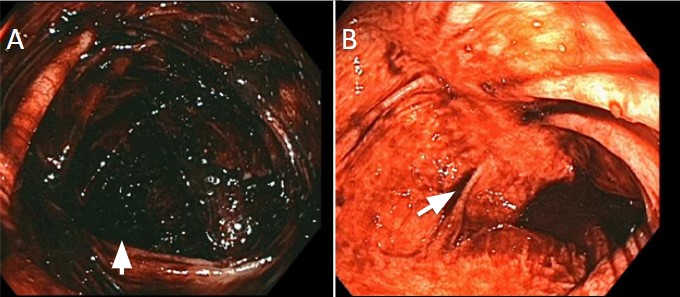Sunday Poster Session
Category: GI Bleeding
P0779 - A Rare Case of Concomitant Gastric Antral Vascular Ectasia and Heyde Syndrome
Sunday, October 27, 2024
3:30 PM - 7:00 PM ET
Location: Exhibit Hall E

Has Audio

Anvit D. Reddy, DO
University of Florida College of Medicine
Jacksonville, FL
Presenting Author(s)
Anvit D. Reddy, DO1, Niyati Patel, DO1, Landen Shane Burstiner, MSc, DO2, Oshin Rai, DO1, Jorge Verdecia, MD3
1University of Florida College of Medicine, Jacksonville, FL; 2University of Florida Health, Jacksonville, FL; 3University of Florida, Jacksonville, FL
Introduction: Heyde syndrome is an uncommon multisystem disorder characterized by aortic stenosis, gastrointestinal bleeding, and acquired von Willebrand disease. Gastric antral vascular ectasia (GAVE) also known as “watermelon stomach” is a rare cause of blood loss that is associated with autoimmune conditions such as Sjogren’s syndrome or chronic conditions such as liver cirrhosis and chronic renal failure. We present a case of a patient who had both of these rare conditions and experienced frequent gastrointestinal bleeding.
Case Description/Methods: A 91-year-old male with a past medical history of hypertension, aortic stenosis status-post bioprosthetic aortic valve replacement, atrial fibrillation not on anticoagulation (due to recurrent gastrointestinal bleeding), GAVE status-post argon plasma coagulation, and diverticulosis presented to the hospital for a chief complaint of blood in his stool. Vitals on admission were significant for a heart rate of 55 bpm and blood pressure of 99/44 mm/hg. Laboratory evaluation revealed bicarbonate of 17 mmol/L, hemoglobin of 5.4 g/dl, and lactic acid of 7.0 mmol/L. He was admitted to the intensive care unit (ICU) for management of suspected gastrointestinal bleeding. Emergent EGD and colonoscopy with gastroenterology along with urgent angiography and nuclear-tagged red blood scans with interventional radiology revealed no active bleeding. Throughout his ICU course he received 14 units of packed red blood cells and his symptoms stabilized, so he was downgraded to Internal Medicine. Before discharge, the patient experienced large bloody bowel movements and eventually lost pulses. Advanced care life services and ancillary medical support were attempted however the patient passed away despite these measures.
Discussion: There is no definitive treatment for Heyde syndrome, however, aortic valve replacement is associated with rapid recovery of bleeding diathesis. Despite this patient’s aortic valve replacement, he continued to experience frequent bouts of gastrointestinal bleeding. GAVE is also a source of acute or chronic bleeding that has traditionally been managed with APC, however, the recurrence rate of bleeding is estimated to be 30-40%. Overall, this patient likely suffered from recurrent bleeding secondary to Heyde syndrome, GAVE, and diverticulosis. In patients with recurrent, frequent gastrointestinal bleeding, it is important to not only rule out acute causes of bleeding but also identify potential causes of chronic bleeding as their implications can be fatal.

Disclosures:
Anvit D. Reddy, DO1, Niyati Patel, DO1, Landen Shane Burstiner, MSc, DO2, Oshin Rai, DO1, Jorge Verdecia, MD3. P0779 - A Rare Case of Concomitant Gastric Antral Vascular Ectasia and Heyde Syndrome, ACG 2024 Annual Scientific Meeting Abstracts. Philadelphia, PA: American College of Gastroenterology.
1University of Florida College of Medicine, Jacksonville, FL; 2University of Florida Health, Jacksonville, FL; 3University of Florida, Jacksonville, FL
Introduction: Heyde syndrome is an uncommon multisystem disorder characterized by aortic stenosis, gastrointestinal bleeding, and acquired von Willebrand disease. Gastric antral vascular ectasia (GAVE) also known as “watermelon stomach” is a rare cause of blood loss that is associated with autoimmune conditions such as Sjogren’s syndrome or chronic conditions such as liver cirrhosis and chronic renal failure. We present a case of a patient who had both of these rare conditions and experienced frequent gastrointestinal bleeding.
Case Description/Methods: A 91-year-old male with a past medical history of hypertension, aortic stenosis status-post bioprosthetic aortic valve replacement, atrial fibrillation not on anticoagulation (due to recurrent gastrointestinal bleeding), GAVE status-post argon plasma coagulation, and diverticulosis presented to the hospital for a chief complaint of blood in his stool. Vitals on admission were significant for a heart rate of 55 bpm and blood pressure of 99/44 mm/hg. Laboratory evaluation revealed bicarbonate of 17 mmol/L, hemoglobin of 5.4 g/dl, and lactic acid of 7.0 mmol/L. He was admitted to the intensive care unit (ICU) for management of suspected gastrointestinal bleeding. Emergent EGD and colonoscopy with gastroenterology along with urgent angiography and nuclear-tagged red blood scans with interventional radiology revealed no active bleeding. Throughout his ICU course he received 14 units of packed red blood cells and his symptoms stabilized, so he was downgraded to Internal Medicine. Before discharge, the patient experienced large bloody bowel movements and eventually lost pulses. Advanced care life services and ancillary medical support were attempted however the patient passed away despite these measures.
Discussion: There is no definitive treatment for Heyde syndrome, however, aortic valve replacement is associated with rapid recovery of bleeding diathesis. Despite this patient’s aortic valve replacement, he continued to experience frequent bouts of gastrointestinal bleeding. GAVE is also a source of acute or chronic bleeding that has traditionally been managed with APC, however, the recurrence rate of bleeding is estimated to be 30-40%. Overall, this patient likely suffered from recurrent bleeding secondary to Heyde syndrome, GAVE, and diverticulosis. In patients with recurrent, frequent gastrointestinal bleeding, it is important to not only rule out acute causes of bleeding but also identify potential causes of chronic bleeding as their implications can be fatal.

Figure: (A) Colonoscopy showing extensive clots in ascending colon
(B) Colonoscopy demonstrating diverticulosis in ascending colon
(B) Colonoscopy demonstrating diverticulosis in ascending colon
Disclosures:
Anvit Reddy indicated no relevant financial relationships.
Niyati Patel indicated no relevant financial relationships.
Landen Shane Burstiner indicated no relevant financial relationships.
Oshin Rai indicated no relevant financial relationships.
Jorge Verdecia indicated no relevant financial relationships.
Anvit D. Reddy, DO1, Niyati Patel, DO1, Landen Shane Burstiner, MSc, DO2, Oshin Rai, DO1, Jorge Verdecia, MD3. P0779 - A Rare Case of Concomitant Gastric Antral Vascular Ectasia and Heyde Syndrome, ACG 2024 Annual Scientific Meeting Abstracts. Philadelphia, PA: American College of Gastroenterology.
